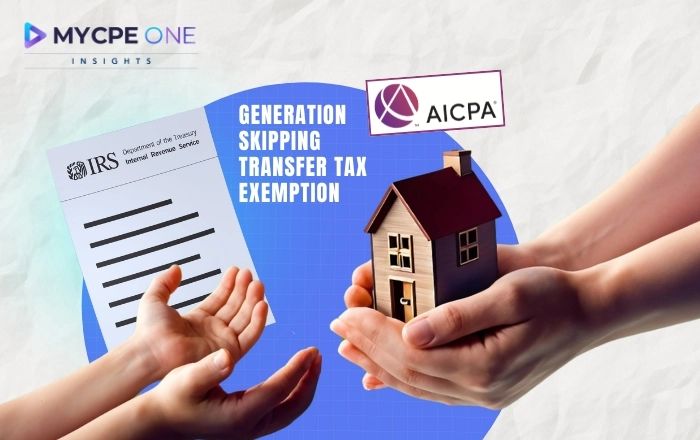


Join 250,000+
professionals today
Add Insights to your inbox - get the latest
professional news for free.

Join our 250K+ subscribers
Join our 250K+ subscribers
Subscribe11 APR 2025 / AICPA UPDATES

The American Institute of CPAs (AICPA) has reviewed the Generation-Skipping Transfer (GST) tax regulations and proposed certain changes to the IRS and Treasury Department to streamline the process and reduce compliance difficulties. Such changes include making Rev. Proc. 2004-46 accessible for a longer period and addressing issues of unintentional GST tax allocations, aiming to simplify estate planning, correct past mistakes, and align tax planning with individuals' financial goals.
Estate planning. For many clients, those two words conjure up images of dusty law books, confusing jargon, and enough paperwork to make a small forest weep. And let's be honest, taxes are rarely a walk in the park either. Now, what happens when you combine the two? You get the Generation-Skipping Transfer (GST) tax. Now, before your eyes glaze over, hear me out. This isn't just some obscure tax rule that only affects billionaires with sprawling estates. It impacts anyone who wants to pass wealth down to their grandchildren (or future generations) without getting walloped by Uncle Sam. Think of it as the government’s way of saying, “Nice try, but we want our cut.”
At face value, the GST tax targets transfer to someone two or more generations below the donor—usually grandchildren. The legislative intent? To block wealthy families from leapfrogging estate taxes by skipping a generation and funneling assets directly to grandkids.
But let’s be real, most professionals already know that part. What makes the GST tax particularly challenging isn’t the concept, but the execution. Between lifetime exemptions, inclusion ratios, trust structures, and the ever-changing regulatory landscape, applying the rules can feel like playing 3D chess with a moving rulebook. That’s exactly where the AICPA’s latest input becomes essential—helping tax advisors, planners, and fiduciaries interpret the nuances and stay ahead of compliance pitfalls.
The American Institute of CPAs has been reviewing the current GST regulations, identifying several areas in need of streamlining. In response, the organization has submitted a letter to the IRS and Treasury Department outlining key proposed changes.
So, what are they suggesting?
Why? Because the current system can be a compliance nightmare. For smaller amounts, getting a Private Letter Ruling (PLR) from the IRS can be costly and time-consuming – a hassle that outweighs the benefits for many taxpayers.
As Eileen Sherr, AICPA Director of Tax Policy and Advocacy, rightly points out in a news release, the current " While the final regulations offer a safety net for missed GST elections, the high cost and complexity make the Private Letter Ruling approach impractical for many taxpayers." Essentially, the AICPA believes these changes would:
If the IRS and Treasury adopt these suggestions, it could mean a smoother ride for those planning their estates and transferring wealth to future generations. It could also reduce the administrative burden on the IRS, freeing up resources to focus on other areas. But here's the million-dollar question: Will they do it? The IRS and Treasury are now considering the AICPA's recommendations. Whether they'll act on them remains to be seen. Tax regulations are constantly evolving, so it's crucial to stay informed and seek professional advice when navigating these complex issues. As the tax landscape continues to shift, one thing's for sure: having advocates like the AICPA fighting for simplification and clarity is a welcome sight. Don't get left behind! Subscribe to MYCPE ONE for the latest updates.
Until next time…
Don’t forget to share this story on LinkedIn, X and Facebook
📢MYCPE ONE Insights has a newsletter on LinkedIn as well! If you want the sharpest analysis of all accounting and finance news without the jargon, Insights is the place to be! Click Here to Join
Unlimited CPE for Just $199/Year!
Get CPE credits by reading or listening to approved content. Enjoy unlimited CPE for CPA (US), EA, CMA, CIA, CFE, SHRM, HRCI, and 100+ other designations—all for just $199 per year! (Learn More)
Team Subscriptions Available – Starting at Just $199/Year!
Schedule a no-obligation call